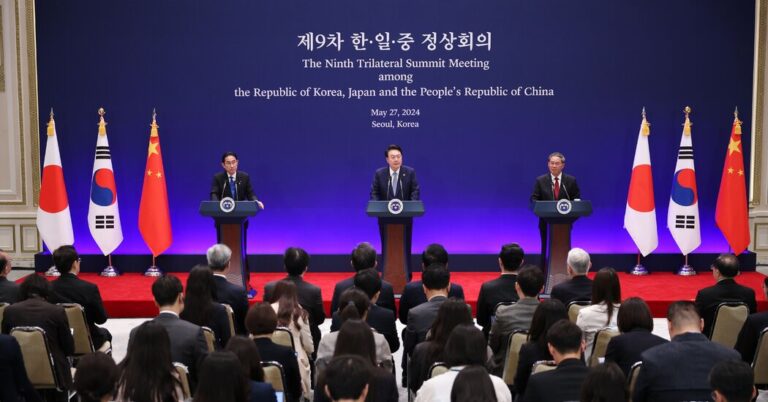The leaders of South Korea and Japan on Monday sought to repair economic cooperation with China, their largest trading partner, in a bid to thaw years of deteriorated ties, but their three-way talks were overshadowed by rising tensions between the United States and China, South Korea’s and Japan’s most important military allies.
The tripartite meeting, attended by South Korean President Yun Seok-yeol, Japanese Prime Minister Fumio Kishida and China’s top leader, Premier Li Qiang, was the first in four and a half years.
The talks focused mainly on areas where the two sides are more likely to find common ground, such as protecting supply chains, facilitating trade and cooperating on the challenges of aging and emerging diseases. They were cautious about thorny regional security issues such as Taiwan and North Korea.
“The three countries agreed to expand practical cooperation in a way that their people can feel the benefits,” Yoon said at a joint press conference with Kishida and Ri, announcing that 2025 and 2026 would be “years of cultural exchange” among the three countries.
But North Korea on Monday highlighted major differences between the three neighbors. Hours before the talks were to begin, it announced plans to put a military spy satellite into orbit. After the summit ended, it carried out the plan by launching a long-range rocket carrying the satellite from a spaceport in North Korea’s northwest.
The country is banned by UN Security Council resolutions from launching such rockets because they use the same technology needed to build intercontinental ballistic missiles.
North Korea’s increasingly aggressive military posture has deepened concern in South Korea and Japan. North Korea has also expanded its arms trade with Russia in defiance of U.N. sanctions, shipping artillery shells and missiles for Moscow’s war efforts in Ukraine, U.S. and South Korean officials say. In return, Moscow is accused of providing energy and technical assistance that could aid North Korea’s missile program.
South Korea and Japan have urged China, North Korea’s biggest backer, to use its economic influence to curb the North’s nuclear and missile programs. So far, China has been reluctant to use its influence, viewing North Korea as a buffer zone against U.S. forces on the Korean peninsula.
On Monday, both Yoon and Kishida sharply criticized North Korea’s satellite launch plans, but Li, who works for China’s top leader, Xi Jinping, stopped short of condemning North Korea and called on all parties involved to exercise “restraint” and work toward a “political solution.”
As the press conference in Seoul concluded, 20 South Korean military aircraft conducted airstrike drills south of the inter-Korean border to warn of “immediate and strong” retaliation against any North Korean provocations.
China, Japan and South Korea had agreed to hold annual tripartite meetings since 2008 to discuss regional cooperation, but the plan has often been disrupted by diplomatic disputes and, more recently, the pandemic. Monday’s meeting in Seoul was the ninth such gathering and the first since December 2019.
During the years of interregnum, strategic competition between Washington and Beijing intensified and relations between China and two U.S. allies deteriorated. China flexed its military muscles and expanded its territorial ambitions in the South and East China Seas, while the United States, Japan and South Korea increased joint military drills and strengthened missile defense and other security cooperation.
Relations between China and its two biggest US allies have been so tense in recent years that analysts say just reviving the tripartite summits would be an achievement, but shared interests have forced Beijing and its two biggest neighbours to revive them.
Yoon said on Monday that the three countries had agreed to hold summits on a regular basis.
The East Asian neighbors together account for more than a fifth of global economic output and need regional stability and cooperation, especially in supply chains, to recover from the post-pandemic economic slowdown. Japan and South Korea view the United States as their most important ally and together they host 80,000 U.S. troops, but their leaders face pressure from companies at home vying for better access to China.
China hopes that greater access to its market can appeal to Japan and South Korea and reduce some of Washington’s influence. To that end, it has agreed to resume free trade agreement negotiations among the three neighbors, emphasizing greater economic cooperation as a means of maintaining peace and stability in the region.
The United States has positioned itself as an intermediary in Asian affairs, pressuring Japan and South Korea to form an alliance to curb China’s rise. Washington has sought to create a wall of restrictions to deny Beijing access to the latest semiconductors, and has urged allies such as Japan and South Korea to cooperate.
On Monday, Li indirectly criticized Washington by calling for a “multipolar” world order and opposing any attempts to form “blocs” and “politicize” trade issues.
Japan and South Korea have forged closer ties in recent years, improving long-strained ties over historical issues, and are also expanding trilateral military cooperation with the United States to deter North Korea and China.
Japan and South Korea have urged China to address issues that are making it increasingly difficult to do business in the country, and Foreign Minister Kishida has called for the early release of Japanese nationals being held in China on suspicion of espionage.
Kim Tae-hyo, deputy director for national security affairs in Yoon’s office, said during bilateral talks on Sunday that South Korea and China agreed to launch new channels to discuss security issues and cooperation in supply chains.
Yoon’s policy of strengthening ties between South Korea and the United States coincides with a sharp decline in South Korean exports to China, which this year replaced China as South Korea’s largest export market for the first time in two decades, according to government data.
David Pearson Contributed report.

